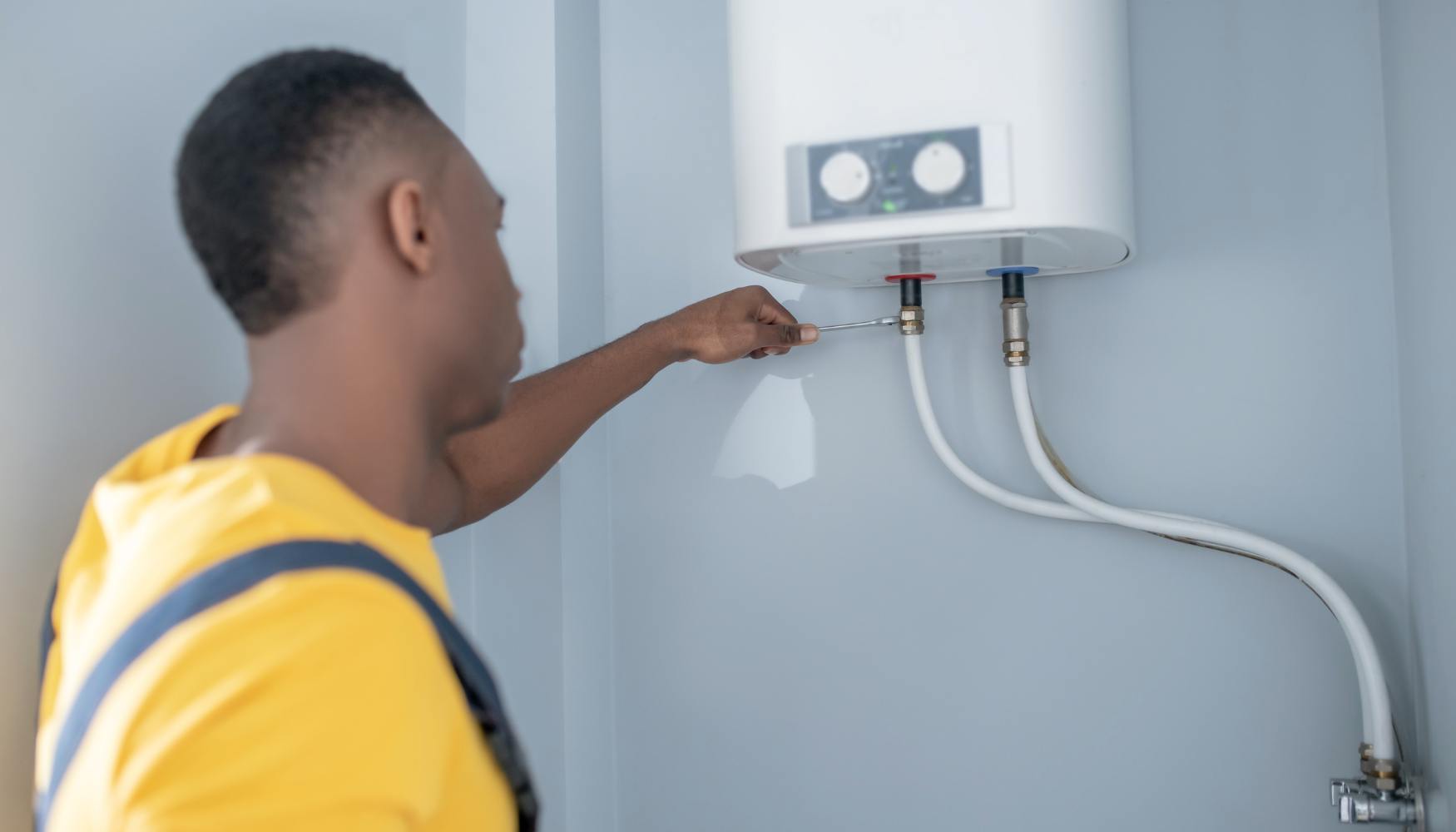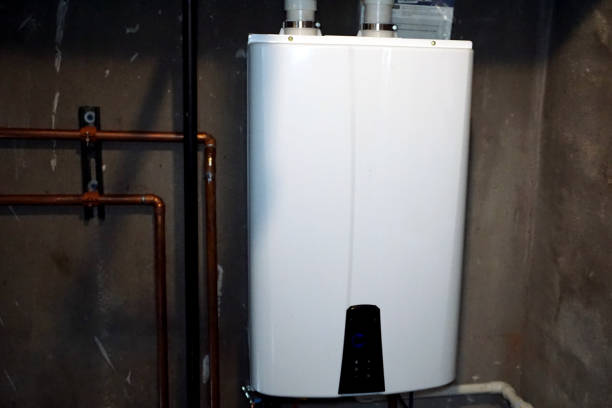We have encountered this great article pertaining to 5 Benefits of Tankless Water Heaters listed below on the web and believe it made sense to quickly share it with you in this article.

In a world where convenience and effectiveness preponderate, it's not a surprise that property owners are frequently on the lookout for smarter ways to manage their home's energy usage and comfort. One advancement that has progressively acquired popularity is the tankless water heater. But just what makes these systems stick out from the traditional tank-based designs most of us grew up with? Let's dive in and check out the advantages of tankless water heaters, assisting you determine if it's time to make the button in your house.
Introduction
Image this: you enter the shower after a lengthy day, expecting a calming cascade of warm water, only to be welcomed by icy beads since the last individual used all of it up. Noise acquainted? Standard hot water heater keep a set amount of hot water, suggesting you go to the mercy of that storage tank's supply. Tankless systems, on the other hand, heat water as needed. Say goodbye to running out mid-shower, no more fumbling with timetables simply to ensure hot water is available.
Comprehending Tankless Water Heaters
What Are Tankless Water Heaters?
Tankless hot water heater, often referred to as on-demand or instant water heaters, offer hot water just as it's needed. Rather than keeping gallons of pre-heated water, these systems kick into action the moment you turn on the faucet. Water passes through a warmth exchanger, heating up in real-time, indicating you obtain an uninterrupted flow of warm water without the demand for a huge tank resting lazily by.
Exactly how Do They Differ from Typical Solutions?
Traditional heating systems hold a tank of warm water, using power to keep that storage tank at a consistent temperature level. Tankless devices eliminate the standing supply, lowering wasted power and the large footprint of a large cyndrical tube. Essentially, you're upgrading from a "accumulation" state of mind to a "made-to-order" strategy.
Typical Sorts Of Tankless Devices
Tankless water heaters typically are available in 2 ranges: gas and electric. Gas models tend to deliver higher circulation prices, ideal for bigger houses, while electrical designs commonly serve smaller homes and are usually simpler to install. In addition, some systems are developed for point-of-use (serving one component) while others can handle the whole home's hot water demands.
Secret Advantages of Tankless Hot Water Heater
Power Performance and Expense Financial Savings
No more heating up a giant container's well worth of water and maintaining it cozy all the time. Tankless heaters minimize standby power losses, which can reduce energy expenses. While the first expense could be higher, the long-lasting financial savings typically warrant the investment.
3. Space-Saving Style
If your home is short on storage, eliminating the cumbersome tank frees up important area. Tankless systems are small and can typically be installed on walls, hidden in corners, or set up in tight utility closets without having all to oneself the whole space.
4. Longer Life expectancy
A well-kept tankless water heater can outlive its tank-based relative. Conventional tanks could last 10-15 years, while tankless designs can keep downing along for twenty years or even more, making them a solid investment with time.
1. Endless Warm Water Supply
Ever before needed to set up showers so every person gets their reasonable share of hot water? With tankless, that comes to be a distant memory. As long as the heating system's circulation ability isn't surpassed, you can take back-to-back showers without developing into a popsicle.
5. Improved Water Quality
Keeping water in a container can often bring about sediment accumulation or a somewhat "off" preference. With tankless systems, fresh water is heated on the spot, minimizing the opportunities of debris buildup and possibly supplying cleaner-tasting water.
Considerations Before Changing
Though the advantages are engaging, it's wise to consider a couple of variables prior to completely devoting.
Evaluating Your Home's Water Use Patterns
If your house simultaneously makes use of multiple fixtures with high warm water demand, ensure the unit's flow price satisfies your needs. Recognizing your use patterns aids you pick the right dimension and sort of tankless heating system.
Upkeep and Treatment Tips
Tankless systems are fairly reduced upkeep, but they aren't set-it-and-forget-it devices.
Routine Cleaning and Descaling
Tough water minerals can build up in the warmth exchanger, influencing effectiveness. Regular descaling (frequently recommended every year) keeps the system going for peak performance.
Annual Specialist Evaluations
A yearly checkup from a specialist makes sure small issues are captured early. They'll analyze the unit's performance, try to find leakages, and assist keep optimum performance.
First Financial Investment Costs
Tankless heating units commonly include a higher ahead of time price tag. Between the system itself and prospective installment alterations, the initial price could provide you sticker label shock. Yet bear in mind to see it as a long-lasting financial investment.
Setup Needs
Relying on your home's facilities, you may require added electric capacity or gas line upgrades. Guarantee you recognize the installation demands and consult with a professional to avoid shocks.
Making Sure Appropriate Air Flow
For gas designs, correct air flow is vital to safely expel exhaust gases. Ensure airing vent systems are clean and correctly mounted to avoid any type of potential safety threats.
Comparing Different Brands and Versions
Not all tankless water heaters are developed equal.
Researching Trusted Makers
Look for respectable brand names with a history of creating top quality units. A reputable producer usually gives much better consumer assistance and longer service warranties.
Installation: Do It Yourself or Professional?
While some homeowners enjoy tackling jobs themselves, tankless setup may not be the very best time to burst out the toolbox.
Benefits and drawbacks of DIY Installment
A do it yourself mount can conserve money, yet it features dangers. Incorrect installment can bring about inefficiency or safety and security issues. If you come in handy and have experience, it could be viable-- but wage care.
Reviewing Evaluations and User Comments
Individual reviews and comments from neighbors or friends who have actually gone tankless can use valuable insights. Often, real-life experiences can be a lot more telling than advertising and marketing pamphlets.
When to Call an Expert Plumber
For most, calling a professional makes certain every little thing's done properly. A specialist plumbing technician comprehends local codes, sizing needs, and venting parameters, reducing the danger of incidents.
Taking full advantage of Efficiency
You have actually invested in a tankless unit-- now maximize its effectiveness.
Optimum Temperature Level Settings
The majority of people establish their units in between 120-140 F. Changing the temperature can boost convenience and financial savings. Experiment to discover a sweet spot that doesn't squander power.
Coupling With Low-Flow Fixtures
Wish to stretch your unit's capacities? Take into consideration installing low-flow showerheads and taps. They decrease water usage, permitting your tankless system to deliver a constant stream of warm water without straining.
Environmental Impact
Tankless water heaters straighten with greener living objectives.
Lowered Carbon Impact
By using less power and just home heating water as needed, tankless systems can reduce your home's carbon impact, decreasing your environmental effect.
Preserving Natural Resources
Less energy usage and much less thrown away hot water translate right into fewer natural resources being utilized, an ecological win-win.
That Profits Most from Tankless Heating systems?
The appeal of tankless heating systems is that they can fit a range of households.
Large Households vs. Solitary Passengers
Large family members might enjoy the unlimited hot water supply, while solitary residents appreciate the power cost savings from not heating up a whole storage tank for just a single person's early morning shower.
Homeowners with Limited Room
If your home is short on square footage, losing the bulky tank liberates area for various other basics-- or possibly just much more elbow room.
Eco-Conscious Customers
Going tankless aligns with environmentally friendly worths, guaranteeing you're not throwing away energy or resources.
Future Fads in Tankless Water Heaters
The world of home devices is ever-evolving, and tankless water heaters are no exception.
Innovations in Innovation
R&D is regularly improving heat exchangers, making units more efficient and sturdy. Future versions could be even quieter, a lot more compact, and far better suited for varying climates.
Smart Home Integration
Think of adjusting your water heater's temperature level by means of an app or obtaining maintenance informs on your phone. As wise home technology advancements, we'll see even more connection and convenience.
Verdict
Choosing a tankless water heater is greater than just upgrading your home's hot water system; it's purchasing long-lasting comfort, power efficiency, and a greener way of living. By considering your home's water use, being mindful of setup requirements, and committing to regular upkeep, you can take pleasure in a steady stream of hot water without the luggage of a cumbersome tank. As modern technology develops, you can look forward to also smarter, more efficient tankless options that not just make your life simpler yet also benefit the world.
Pros and Cons of Tankless Water Heaters
Tankless Water Heater Pros
Saves Energy: Simply put, you re spending less energy to create hot water, so your total carbon footprint goes down, not to mention your bills. Lasts Longer Than Storage Tanks: Storage tank units need to be replaced every 15 years or so. But tankless units? They can last for 30 years before they give out on you. Constant Hot Water: Need to take a shower and don t want the water running cold? Awesome it won t. The water will stay hot the entire time because it creates hot water on demand. Saves You Money: Less water usage equals less money. Beyond that, you re not paying to keep water hot 24/7. Those savings add up quickly. Better for the Environment: Less water waste is better for everyone. It saves you money, but it s also environmentally conscious at the same time. Tankless Water Heater Cons
It Can Take a Minute: Depending on your specific unit and its placement, it can take anywhere from 10 seconds to 2 minutes to fully heat up. Because there s no storage tank, it heats water as you need it. Upfront Purchase Price: While we talked about their longevity, there s sticker shock when you look at brand-new tankless units to install. It pays for itself, but it s still a big chunk of change at first. Has its Limits: If you run multiple appliances at once, such as the dishwasher, washing machine, and maybe you take a shower at the same time, there might not be enough hot water. https://www.airsouthnow.com/blog/water-heater-service/pros-and-cons-of-tankless-water-heaters/

We were shown that article on through someone on a different domain. Kindly take the opportunity to share this write-up if you liked it. Thanks for your time spent reading it.
Get An Estimate